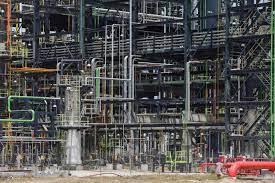LONDON (Reuters): One of Europe’s main markets for gasoline has shrunk, threatening to squeeze European refiners, after Nigeria removed fuel subsidies, which destroyed much of the country’s domestic demand and a regional market for smuggled fuel.
North America and West Africa (WAF), with Nigeria at the helm, historically have been the top two destinations for petrol exports from Europe, which produces more gasoline than it uses, meaning its refiners rely on exports to support profit margins.
A steady decline in European refining margins in recent years, as competition from the Middle East, the United States and Asia grew, was reversed when fears of fuel supply shortages boosted profits after Russia’s invasion of Ukraine. So far, benchmark profit margins for gasoline in northwestern Europe have held firm at around $27 a barrel, Refinitiv Eikon data shows.
They have been supported by demand from North America, a shortage of high quality blending materials, disruption caused by low water levels inland and local refinery outages.
But analysts say the reduction of flows following the upheaval in Nigeria will increase pressure on European refiners, and any winners are likely to be newer Middle Eastern refineries. At the end of May, Nigeria’s President Bola Tinubu scrapped a popular but expensive subsidy on the fuel, which cost the cash-strapped government $10 billion last year. Petrol demand in response fell by 28%, official data showed. Symptomatic of the fall in demand, onshore gasoline stocks in Nigeria have climbed to 960,000 tonnes from an average 613,000 tonnes between January and June, said Jeremy Parker at the CITAC consultancy which focuses on Africa’s downstream energy market.
Meanwhile, the black market for smuggled subsidised Nigerian fuel in Togo and neighbouring Benin and Cameroon has collapsed, further reducing demand for shipments via Nigeria. There is no reliable data on how much fuel was smuggled out of Nigeria under the subsidy regime, but a comparison of estimates from official and independent sources indicate more than a third of petrol could have left state oil firm NNPC’s depots every day to be sold illegally abroad.
Without the subsidy, the financial incentive for smuggling disappears.
Average monthly West African (WAF) gasoline imports fell by 56% in the second quarter compared with the first, according to Refinitiv Eikon data.
“The key point is demand from West Africa is drying up,” said Refinitiv Lead Oil Analyst Raj Rajendran.
Seasonally, June loadings from the Amsterdam-Rotterdam-Antwerp (ARA) hub to West Africa fell to 629,000 tonnes this year from 895,000 tonnes last year and 1.2 million tonnes in 2021, Refinitiv data showed.







